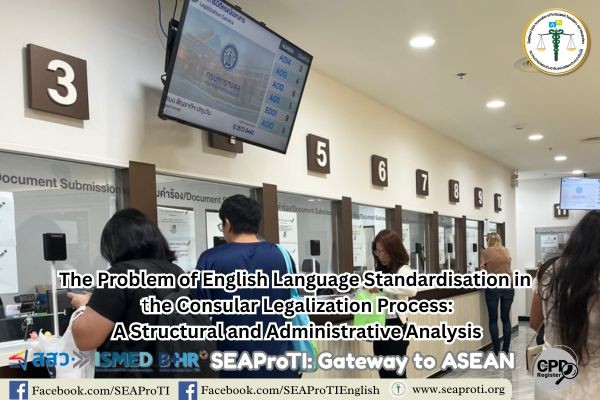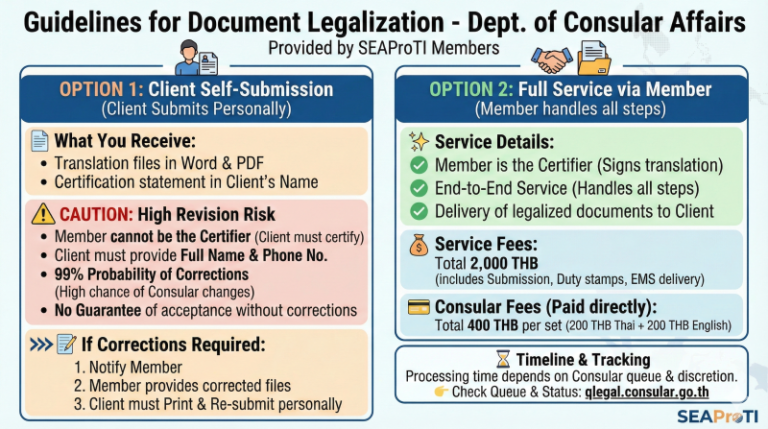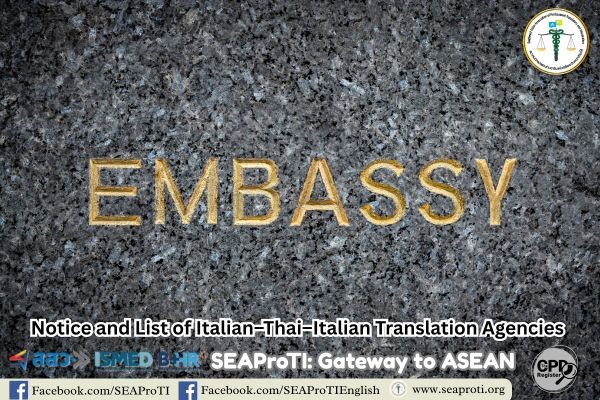The Right of Foreign Defendants to Appoint Their Own Interpreter: A Neglected Issue in Thai Courts
5 December 2025, Bangkok – In Thailand’s criminal justice system, every defendant is entitled to a fair trial, whether they are Thai nationals or foreigners. For foreign defendants who cannot communicate in Thai, the right to appoint their own interpreter is a fundamental safeguard that ensures their understanding of court proceedings and their ability to defend their rights. However, Thai courts often fail to properly recognize and enforce this right, leading to potential violations of defendants’ rights.
The Right to Appoint One’s Own Interpreter
According to international human rights principles and judicial norms in many countries, foreign defendants have the right to appoint an interpreter they trust to assist in court proceedings. This right is enshrined in international agreements such as the International Covenant on Civil and Political Rights (ICCPR), to which Thailand is a party. The ICCPR stipulates that defendants have the right to receive interpretation services if they do not understand the language used in the proceedings.
Although Thai law does not explicitly guarantee this right, it should be considered an integral part of protecting defendants’ rights and ensuring fairness in judicial processes.
The Importance of This Right
Having an interpreter who understands the defendant’s language and cultural context reduces the risk of miscommunication during court proceedings. Accurate interpretation directly impacts the defendant’s ability to defend their rights. Moreover, allowing defendants to appoint their own interpreter fosters trust in the justice system and enhances transparency in legal processes.
Implementation in Thai Courts: A Gap to Address
In practice, foreign defendants in Thailand often lack information about their right to appoint their own interpreter. In cases where the court or officials appoint interpreters, defendants may not realize they can challenge the appointment of interpreters who lack trustworthiness or proper qualifications. This oversight leads to several issues:
-
Court-Appointed Interpreters: Some courts rely on interpreters who have undergone internal training, but these interpreters may lack linguistic expertise or knowledge of legal processes, leading to translation errors.
-
Lack of Neutrality: Defendants may feel that court-appointed interpreters lack impartiality or are pressured by other individuals in the courtroom, undermining fairness.
-
Violation of Fundamental Rights: Failure to inform defendants of their right to appoint their own interpreter restricts their options and may hinder their ability to adequately defend themselves. Furthermore, court-appointed interpreters may not always be rigorously screened, resulting in insufficient skills or experience.
Consequences of Violating This Right
Denying defendants the right to appoint their own interpreter affects not only the fairness of judicial proceedings but also the international perception of Thailand’s justice system. High-profile cases involving foreign defendants can attract international attention, and rights violations may lead to complaints to human rights organizations or international courts, damaging confidence in Thailand’s legal framework.
Challenges and Obstacles
-
Lack of Clear Legal Provisions: Thailand does not have clear legal statutes outlining the rights of foreign defendants to appoint their own interpreters, leaving the implementation of this right to the discretion of the courts.
-
Shortage of Legally Knowledgeable Interpreters: Interpreters with linguistic skills may lack an understanding of legal terminology and procedures, which can compromise the accuracy of courtroom interpretation.
-
Insufficient Training and Assessment: Interpreters working in courts should undergo rigorous training and evaluation to ensure they are equipped to handle the complexities of judicial proceedings.
Solutions to Protect Defendants’ Rights
-
Clear Communication of Rights: Courts should have a responsibility to clearly inform foreign defendants of their right to appoint their own interpreter. This can include providing easy-to-understand documentation or guides.
-
Establishing Interpreter Standards: Court interpreters should be required to undergo training and testing in both language proficiency and legal knowledge to ensure quality and impartiality. Certification or official registration could further enhance interpretation standards in courts.
-
Support for Complaints: Defendants who feel their rights to appoint an interpreter have been violated should have access to straightforward mechanisms for filing complaints or seeking assistance from relevant organizations, such as human rights offices or legal aid groups.
-
Developing an Interpreter Database: Creating a database of qualified interpreters with verified credentials would address the shortage of competent interpreters and increase transparency in the appointment process.
Conclusion
The right to appoint one’s own interpreter is crucial for ensuring justice for foreign defendants in court proceedings. The failure of Thai courts to recognize or grant this right constitutes a violation of human rights and damages the credibility of the justice system on an international level. Immediate steps to align with international standards and to protect defendants’ rights are essential. By improving transparency and strengthening protections, Thailand’s justice system can foster greater trust and bolster its reputation in the global community.
About SEAProTI’s certified translators, translation certification providers, and certified interpreters:
The Southeast Asian Association of Professional Translators and Interpreters (SEAProTI) has officially announced the criteria and qualifications for individuals to register as “Certified Translators,” “Translation Certification Providers,” and “Certified Interpreters” under the association’s regulations. These guidelines are detailed in Sections 9 and 10 of the Royal Thai Government Gazette, issued by the Secretariat of the Cabinet under the Office of the Prime Minister of the Kingdom of Thailand, dated July 25, 2024, Volume 141, Part 66 Ng, Page 100.
To read the full publication, visit: the Royal Thai Government Gazette
สิทธิของผู้ต้องหาชาวต่างชาติในการหาล่ามมาเอง: การละเมิดสิทธิที่ไม่ควรมองข้ามในศาลไทย
5 มกราคม 2568, กรุงเทพมหานคร – ในกระบวนการยุติธรรมทางอาญาในประเทศไทย ผู้ต้องหาทุกคนมีสิทธิในการต่อสู้คดีอย่างเท่าเทียม ไม่ว่าจะเป็นคนไทยหรือชาวต่างชาติ อย่างไรก็ตาม สำหรับผู้ต้องหาชาวต่างชาติที่ไม่สามารถสื่อสารภาษาไทยได้ สิทธิในการหาล่ามมาเองควรเป็นหลักประกันสำคัญที่ช่วยให้พวกเขาเข้าใจกระบวนการพิจารณาคดีและสามารถปกป้องสิทธิของตนเองได้อย่างเต็มที่ ทว่าบ่อยครั้ง ศาลไทยกลับไม่ยอมให้สิทธินี้อย่างถูกต้องและครบถ้วน ซึ่งอาจถือได้ว่าเป็นการละเมิดสิทธิของผู้ต้องหา
สิทธิของผู้ต้องหาชาวต่างชาติในการจัดหาล่าม
ตามหลักการสากลว่าด้วยสิทธิมนุษยชนและหลักการยุติธรรมในหลายประเทศ ผู้ต้องหาชาวต่างชาติมีสิทธิที่จะจัดหาล่ามที่ตนเองไว้วางใจเข้ามาช่วยแปลในกระบวนการพิจารณาคดี สิทธินี้ถูกยืนยันผ่านกติกาสากล เช่น International Covenant on Civil and Political Rights (ICCPR) ที่ประเทศไทยเป็นภาคี ซึ่งระบุว่าผู้ต้องหามีสิทธิที่จะได้รับการแปลภาษาในกรณีที่ไม่เข้าใจภาษาของกระบวนการ
ในบริบทของกฎหมายไทย แม้ไม่ได้บัญญัติไว้อย่างชัดเจน แต่สิทธิในการหาล่ามมาเองควรเป็นส่วนหนึ่งของการปกป้องสิทธิของผู้ต้องหาเพื่อให้เกิดความเป็นธรรมในการพิจารณาคดี
ความสำคัญของสิทธิในการหาล่ามมาเอง
การมีล่ามที่เข้าใจภาษาและวัฒนธรรมของผู้ต้องหาช่วยลดความเสี่ยงของการเข้าใจผิดในกระบวนการพิจารณาคดี ความถูกต้องของการแปลส่งผลโดยตรงต่อความสามารถของผู้ต้องหาในการปกป้องสิทธิของตนเอง นอกจากนี้ การที่ผู้ต้องหาเลือกหาล่ามเองยังช่วยสร้างความไว้วางใจในระบบยุติธรรมและเพิ่มความโปร่งใสในการดำเนินคดีอีกด้วย
การปฏิบัติในศาลไทย: ช่องว่างที่ต้องเติมเต็ม
ในทางปฏิบัติ ผู้ต้องหาชาวต่างชาติในประเทศไทยมักไม่ได้รับข้อมูลเกี่ยวกับสิทธิในการจัดหาล่ามมาเอง โดยเฉพาะอย่างยิ่งในกรณีที่ศาลหรือเจ้าหน้าที่เป็นผู้จัดหาล่ามให้ ผู้ต้องหาบางรายอาจไม่ทราบว่าพวกเขาสามารถคัดค้านการใช้ล่ามที่ไม่ได้มาตรฐานหรือไม่ได้รับความไว้วางใจได้ ซึ่งนำไปสู่ปัญหาในหลายด้าน ได้แก่:
-
การบังคับใช้ล่ามของศาล: ศาลบางแห่งเลือกใช้ล่ามที่ผ่านการอบรมภายใน แต่ล่ามเหล่านี้บางครั้งขาดความเชี่ยวชาญทางภาษาหรือความรู้ในกระบวนการทางกฎหมาย ทำให้การแปลเกิดความผิดพลาดได้ง่าย
-
การขาดความเป็นกลางของล่าม: ผู้ต้องหาอาจรู้สึกว่าล่ามที่ศาลจัดหาไม่มีความเป็นกลาง หรืออาจถูกกดดันจากบุคคลอื่นในห้องพิจารณาคดี ซึ่งสร้างความไม่ยุติธรรมในการดำเนินคดี
-
การละเมิดสิทธิขั้นพื้นฐาน: การไม่แจ้งสิทธิในการหาล่ามมาเองถือเป็นการจำกัดทางเลือกของผู้ต้องหา ซึ่งอาจส่งผลกระทบต่อความสามารถในการต่อสู้คดีของพวกเขา นอกจากนี้ ล่ามที่ศาลจัดหาอาจไม่ได้รับการคัดเลือกอย่างเข้มงวด ทำให้บางครั้งล่ามขาดทักษะและประสบการณ์ที่เพียงพอ
ผลกระทบของการละเมิดสิทธินี้
การปฏิเสธสิทธิในการจัดหาล่ามมาเองไม่เพียงส่งผลกระทบต่อความยุติธรรมในกระบวนการพิจารณาคดีเท่านั้น แต่ยังส่งผลต่อภาพลักษณ์ของระบบยุติธรรมไทยในระดับสากล โดยเฉพาะอย่างยิ่งในกรณีที่คดีดังกล่าวได้รับความสนใจจากนานาชาติ การละเมิดสิทธิของผู้ต้องหาอาจนำไปสู่การร้องเรียนต่อองค์กรสิทธิมนุษยชนหรือศาลระหว่างประเทศ ซึ่งสร้างความเสียหายต่อความเชื่อมั่นในระบบกฎหมายของประเทศ
ปัญหาและอุปสรรคที่เกี่ยวข้อง
-
การขาดความชัดเจนในกฎหมาย: ประเทศไทยยังไม่มีบทบัญญัติทางกฎหมายที่ชัดเจนเกี่ยวกับสิทธิของผู้ต้องหาชาวต่างชาติในการหาล่ามมาเอง ทำให้การบังคับใช้สิทธินี้ขึ้นอยู่กับดุลพินิจของศาล
-
การขาดแคลนล่ามที่มีความรู้ด้านกฎหมาย: ล่ามที่มีทักษะทางภาษาบางครั้งอาจขาดความเข้าใจในกระบวนการยุติธรรม ส่งผลต่อความถูกต้องของการแปลในศาล
-
การขาดการอบรมและทดสอบล่าม: ล่ามที่ทำงานในศาลควรผ่านการอบรมและการประเมินความสามารถอย่างเข้มงวด เพื่อให้มั่นใจว่าพวกเขามีความพร้อมที่จะรับมือกับความซับซ้อนในกระบวนการพิจารณาคดี
แนวทางแก้ไขเพื่อปกป้องสิทธิของผู้ต้องหา
-
แจ้งสิทธิอย่างชัดเจน: ศาลควรมีหน้าที่แจ้งสิทธิให้ผู้ต้องหาชาวต่างชาติทราบอย่างชัดเจนว่าพวกเขาสามารถจัดหาล่ามมาเองได้ รวมถึงจัดทำเอกสารหรือคู่มือที่เข้าใจง่ายเพื่อให้ผู้ต้องหาสามารถปฏิบัติตามได้
-
การกำหนดมาตรฐานล่าม: ล่ามที่ทำหน้าที่ในกระบวนการพิจารณาคดีควรผ่านการอบรมและทดสอบความรู้ความสามารถทางภาษาและกฎหมาย เพื่อให้มั่นใจได้ว่ามีคุณภาพและความเป็นกลาง การออกใบรับรองหรือการขึ้นทะเบียนล่ามอย่างเป็นทางการอาจช่วยยกระดับมาตรฐานการแปลในศาล
-
การสนับสนุนการร้องเรียน: ผู้ต้องหาที่รู้สึกว่าถูกละเมิดสิทธิในการเลือกใช้ล่ามควรสามารถร้องเรียนหรือขอความช่วยเหลือจากหน่วยงานที่เกี่ยวข้องได้อย่างง่ายดาย เช่น สำนักงานคุ้มครองสิทธิมนุษยชน หรือองค์กรที่ให้ความช่วยเหลือด้านกฎหมายแก่ชาวต่างชาติ
-
การพัฒนาฐานข้อมูลล่าม: การสร้างฐานข้อมูลล่ามที่มีคุณสมบัติครบถ้วนและพร้อมให้บริการในศาลสามารถช่วยลดปัญหาการขาดแคลนล่ามที่มีคุณภาพ และเพิ่มความโปร่งใสในการจัดหาล่าม
สรุป
สิทธิในการหาล่ามมาเองเป็นปัจจัยสำคัญที่ช่วยให้ผู้ต้องหาชาวต่างชาติได้รับความยุติธรรมในกระบวนการพิจารณาคดี การที่ศาลไทยละเลยหรือไม่ยอมให้สิทธินี้ ไม่เพียงแต่เป็นการละเมิดสิทธิมนุษยชนของผู้ต้องหา แต่ยังส่งผลกระทบต่อความน่าเชื่อถือของระบบยุติธรรมในระดับสากล การพัฒนาระบบให้สอดคล้องกับหลักการสากลและการปกป้องสิทธิของผู้ต้องหาอย่างจริงจังเป็นสิ่งที่ควรได้รับความสำคัญในทันที หากระบบยุติธรรมสามารถปรับปรุงและเพิ่มความโปร่งใสในประเด็นนี้ได้ จะช่วยสร้างความไว้วางใจและเสริมสร้างภาพลักษณ์ที่ดีให้แก่ประเทศไทยในสายตาของชุมชนนานาชาติ
เกี่ยวกับนักแปลรับรอง ผู้รับรองการแปล และล่ามรับรองของสมาคมวิชาชีพนักแปลและล่ามแห่งเอเชียตะวันออกเฉียงใต้
สมาคมวิชาชีพนักแปลและล่ามแห่งเอเชียตะวันออกเฉียงใต้ (SEAProTI) ได้ประกาศหลักเกณฑ์และคุณสมบัติผู้ที่ขึ้นทะเบียนเป็น “นักแปลรับรอง (Certified Translators) และผู้รับรองการแปล (Translation Certification Providers) และล่ามรับรอง (Certified Interpreters)” ของสมาคม หมวดที่ 9 และหมวดที่ 10 ในราชกิจจานุเบกษา ของสำนักเลขาธิการคณะรัฐมนตรี ในสำนักนายกรัฐมนตรี แห่งราชอาณาจักรไทย ลงวันที่ 25 ก.ค. 2567 เล่มที่ 141 ตอนที่ 66 ง หน้า 100 อ่านฉบับเต็มได้ที่: นักแปลรับรอง ผู้รับรองการแปล และล่ามรับรอง

























